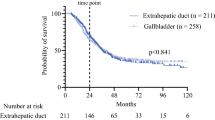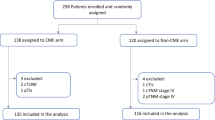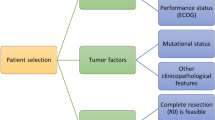Abstract
Purpose
About 30% of colorectal cancers (CRCs) present with acute symptoms. The adequacy of oncologic resections is a matter of concern since few authors reported that emergency surgery in these patients results in a lower lymph node harvest (LNH). In addition, emergency resections have been reported with a longer hospital stay and higher morbidity rate. We thus conducted a propensity score-matched analysis with the aim of investigating LNH in emergency specimens comparing with elective ones. Secondary aim was the comparison of morbidity and hospital stay.
Methods
Eighty-seven consecutive R0 emergency surgical procedures were matched with elective CRCs using the propensity score method and the following covariates: age, sex, stage, and localization. Groups were compared using univariate and multivariate analyses. Outcome measures were LNH, nodal ratio, Clavien’s morbidity grades, and hospital stay.
Results
Emergency patients presented more metastatic nodes compared with elective ones (p 0.017); however, both presented a comparable mean LNH. Multivariate analysis documented that a T stage ≥3 was the only variable correlated with a nodal positivity (OR 6.3). On univariate analysis, emergency CRCs had a longer mean hospital stay compared with elective resections (p 0.006) and a higher rate of Clavien ≥4 events (p 0.0173). Finally, emergency resection and an age >66 years were variables independently correlated with a mean hospital stay >10 days (OR, respectively, 3.7 and 3.5).
Conclusions
Emergency CRC resections were equivalent to the elective procedures with respect to LNH. However, emergency surgery correlated with a longer mean hospital stay.

Emergency and Elective resections for CRC provide similar LNH.



Similar content being viewed by others
References
Ansaloni L, Andersson RE, Bazzoli F, Catena F, Cennamo V, Di Saverio S, Fuccio L, Jeekel H, Leppäniemi A, Moore E, Pinna AD, Pisano M, Repici A, Sugarbaker PH, Tuech JJ (2010) Guidelines in the management of obstructing cancer of the left colon: consensus conference of the World Society of Emergency Surgery (WSES) and Peritoneum and Surgery (PnS) Society. World J Emerg Surg 5:29. doi:10.1186/1749-7922-5-29
Scott NA, Jeacock J, Kingston RD (1995) Risk factors in patients presenting as an emergency with colorectal cancer. Br J Surg 82:321–323
Wong SK, Jalaludin BB, Morgan MJ, Berthelsen AS, Morgan A, Gatenby AH, Fulham SB (2008) Tumor pathology and long-term survival in emergency colorectal cancer. Dis Colon Rectum 51:223–230
Ghazi S, Berg E, Lindblom A, Lindforss U, Low-Risk Colorectal Cancer Study Group (2013) Clinicopathological analysis of colorectal cancer: a comparison between emergency and elective surgical cases. World J Surg Oncol 11:133. doi:10.1186/1477-7819-11-133
Kermani R, Coury JJ, Dao H, Lee JH, Miller PE, Yee D, Contant C, Hackford AW (2013) A practical mortality risk score for emergent colectomy. Dis Colon Rectum 56:467–474
Serpell JW, McDermott FT, Katrivessis H, Hughes ES (1989) Obstructing carcinoma of the colon. Br J Surg 76:965–969
Brown SC, Walsh S, Abraham JS, Sykes PA (1991) Risk factors and operative mortality in surgery for colorectal cancers. Ann R Coll Surg Engl 73:269–272
Gunderson LL, Jessup JM, Sargent DJ, Greene FL, Stewart AK (2010) Revised TN categorization for colon cancer based on national survival outcomes data. J Clin Oncol 28:264–271. doi:10.1200/JCO.2009.24.0952
La Torre M, Mazzuca F, Ferri M, Mari FS, Botticelli A, Pilozzi E, Lorenzon L, Osti MF, Marchetti P, Enrici RM, Ziparo V (2013) The importance of lymph node retrieval and lymph node ratio following preoperative chemoradiation of rectal cancer. Color Dis 15:e382–e388. doi:10.1111/codi.12242
La Torre M, Lorenzon L, Pilozzi E, Barucca V, Cavallini M, Ziparo V, Ferri M (2012) Number of harvested lymph nodes is the main prognostic factor in stage IIa colorectal cancer patients. J Surg Oncol 106:469–474. doi:10.1002/jso.23101
Porter GA, Urquhart R, Bu J, Johnson P, Grunfeld E (2011) The impact of audit and feedback on nodal harvest in colorectal cancer. BMC Cancer 11:2. doi:10.1186/1471-2407-11-2
Patel SV, Patel SV, Brackstone M (2014) Emergency surgery for colorectal cancer does not result in nodal understaging compared with elective surgery. Can J Surg 57:349–353
Bass G, Fleming C, Conneely J, Martin Z, Mealy K (2009) Emergency first presentation of colorectal cancer predicts significantly poorer outcomes: a review of 356 consecutive Irish patients. Dis Colon Rectum 52:678–684
McArdle CS, Hole DJ (2004) Emergency presentation of colorectal cancer is associated with poor 5-year survival. Br J Surg 91:605–609
Metcalfe MS, Norwood MG, Miller AS, Hemingway D (2005) Unreasonable expectations in emergency colorectal cancer surgery. Color Dis 7:275–278
Costa G, Stella F, Venturini L, Tierno SM, Tomassini F, Fransvea P, Frezza B, Bocchetti T, Di Somma S, Balducci G (2013) The usefulness of a trauma registry and the role of the general surgeon in the multidisciplinary approach to trauma patients: 3-year experience at Sant’Andrea University Hospital in Rome. Ann Ital Chir 84:1–8
Lorenzon L, Costa G, Massa G, Frezza B, Stella F, Balducci G (2017) The impact of frailty syndrome and risk scores on emergency cholecystectomy patients. Surg Today 47:74–83
Sjo OH, Merok MA, Svindland A, Nesbakken A (2012) Prognostic impact of lymph node harvest and lymph node ratio in patients with colon cancer. Dis Colon Rectum 55:307–315
Ferri M, Lorenzon L, Onelli MR, La Torre M, Mercantini P, Virgilio E, Balducci G, Ruco L, Ziparo V, Pilozzi E (2013) Lymph node ratio is a stronger prognostic factor than microsatellite instability in colorectal cancer patients: results from a 7 years follow-up study. Int J Surg 11:1016–1021. doi:10.1016/j.ijsu.2013.05.031
Lorenzon L, Montebelli F, Mercantini P, Sebastiani S, Ziparo V, Ferri M (2016) Right colectomy for cancer: a matched comparison of three different surgical approaches. J Investig Surg 29:405–412
Costa G, La Torre M, Frezza B, Fransvea P, Tomassini F, Ziparo V, Balducci G (2014) Changes in the surgical approach to colonic emergencies during a 15-year period. Dig Surg 31:197–203. doi:10.1159/000365254
Ho YH, Seow-Choen F, Leong A, Eu KW, Nyam D, Teoh MK (1999) Randomized, controlled trial of low molecular weight heparin vs no deep vein thrombosis prophylaxis for major colon and rectal surgery in Asian patients. Dis Colon Rectum 42:196–202
Bratzler DW, Houck PM, Surgical Infection Prevention Guidelines Writers Workgroup; American Academy of Orthopaedic Surgeons; American Association of Critical Care Nurses; American Association of Nurse Anesthetists; American College of Surgeons; American College of Osteopathic Surgeons; American Geriatrics Society; American Society of Anesthesiologists; American Society of Colon and Rectal Surgeons; American Society of Health-System Pharmacists; American Society of PeriAnesthesia Nurses; Ascension Health; Association of periOperative Registered Nurses; Association for Professionals in Infection Control and Epidemiology; Infectious Diseases Society of America; Medical Letter; Premier; Society for Healthcare Epidemiology of America; Society of Thoracic Surgeons; Surgical Infection Society (2004) Antimicrobial prophylaxis for surgery: an advisory statement from the National Surgical Infection Prevention Project. Clin Infect Dis 38:1706–1715
Jansen JO, O'Kelly TJ, Krukowski ZH, Keenan RA (2002) Right hemicolectomy: mechanical bowel preparation is not required. J R Coll Surg Edinb 47:557–560
Wasey N, Baughan J, de Gara CJ (2003) Prophylaxis in elective colorectal surgery: the cost of ignoring the evidence. Can J Surg 46:279–284
Dindo D, Demartines N, Clavien PA (2004) Classification of surgical complications: a new proposal with evaluation in a cohort of 6336 patients and results of a survey. Ann Surg 240:205–213
Kyllönen LE (1987) Obstruction and perforation complicating colorectal carcinoma. Acta Chir Scand 153:607–614
Runkel N, Schlag P, Schwarz V, Herfarth C (1991) Outcome after emergency surgery for cancer of the large intestine. Br J Surg 78:183–188
Xu Z, Becerra AZ, Aquina CT, Hensley BJ, Justiniano CF, Boodry C, Swanger AA, Arsalanizadeh R, Noyes K, Monson JR, Fleming FJ (2017) Emergent colectomy is independently associated with decreased long-term overall survival in colon cancer patients. J Gastrointest Surg doi. doi:10.1007/s11605-017-3355-8
Biondo S, Martí-Ragué J, Kreisler E, Parés D, Martín A, Navarro M, Pareja L, Jaurrieta E (2005) A prospective study of outcomes of emergency and elective surgeries for complicated colonic cancer. Am J Surg 189:377–383
Sucullu I, Ozdemir Y, Cuhadar M, Balta AZ, Yucel E, Filiz AI, Gulec B (2015) Comparison of emergency surgeries for obstructed colonic cancer with elective surgeries: a retrospective study. Pak J Med Sci 31:1322–1327
Gonsalves WI, Kanuri S, Tashi T, Aldoss I, Sama A, Al-Howaidi I, Ganta A, Kalaiah M, Thota R, Krishnamurthy J, Fang X, Townley P, Ganti AK, Subbiah S, Silberstein PT (2011) Clinicopathologic factors associated with lymph node retrieval in resectable colon cancer: a veterans’ affairs central cancer registry (VACCR) database analysis. J Surg Oncol 104:667–7134
Evans MD, Barton K, Rees A, Stamatakis JD, Karandikar SS (2008) The impact of surgeon and pathologist on lymph node retrieval in colorectal cancer and its impact on survival for patients with Dukes’ stage B disease. Color Dis 10:157–164
Nedrebo BS, Soreide K, Nesbakken A, Eriksen MT, Soreide JA, Korner H, Norwegian Colorectal Cancer Group (2013) Risk factors associated with poor lymph node harvest after colon cancer surgery in a national cohort. Color Dis 15:e301–e308
Odermatt M, Miskovic D, Siddiqi N, Khan J, Parvaiz A (2013) Short- and long-term outcomes after laparoscopic versus open emergency resection for colon cancer: an observational propensity score-matched study. World J Surg 37:2458–2467
Author information
Authors and Affiliations
Corresponding author
Ethics declarations
A formal IRB approval was not required because of the un-interventional retrospective design; however, a signed consent for the treatment and the evaluation of data was obtained from all patients before the surgical procedures both in the elective and in the emergency settings.
Conflict of interest
The authors declare that they have no conflict of interest.
Rights and permissions
About this article
Cite this article
Costa, G., Lorenzon, L., Massa, G. et al. Emergency surgery for colorectal cancer does not affect nodal harvest comparing elective procedures: a propensity score-matched analysis. Int J Colorectal Dis 32, 1453–1461 (2017). https://doi.org/10.1007/s00384-017-2864-y
Accepted:
Published:
Issue Date:
DOI: https://doi.org/10.1007/s00384-017-2864-y




